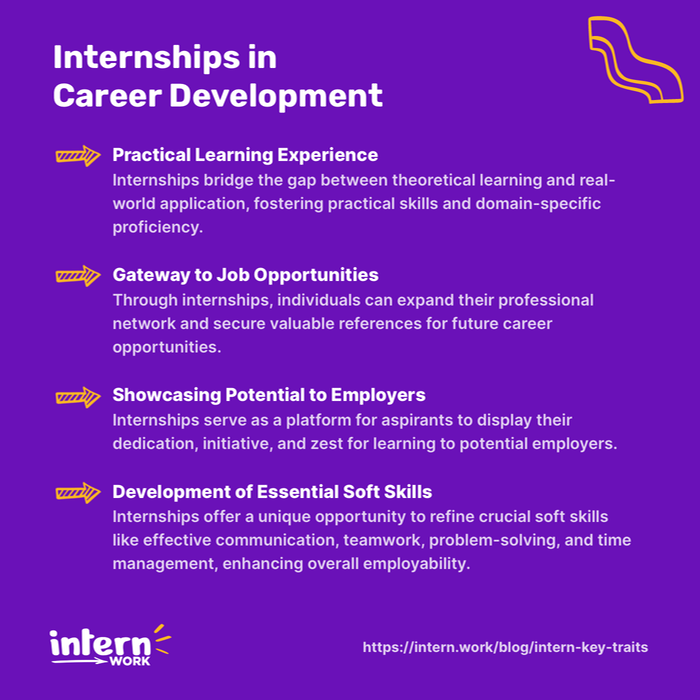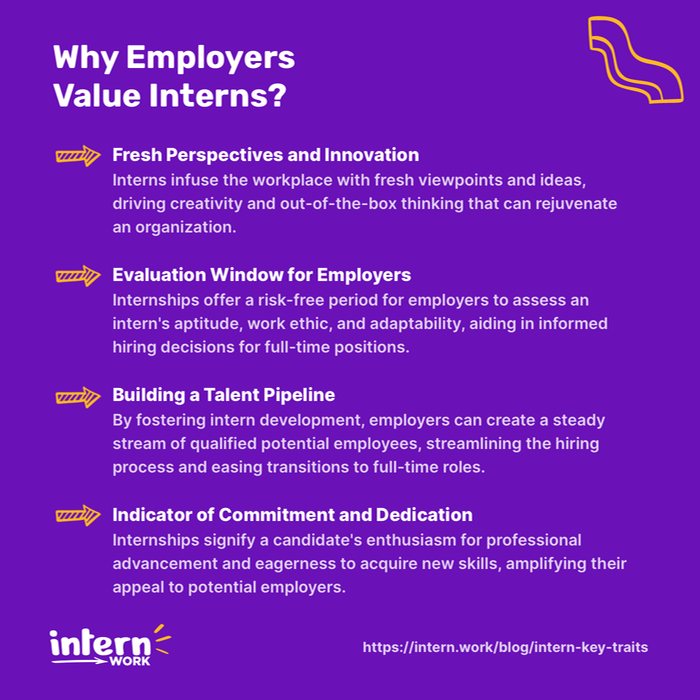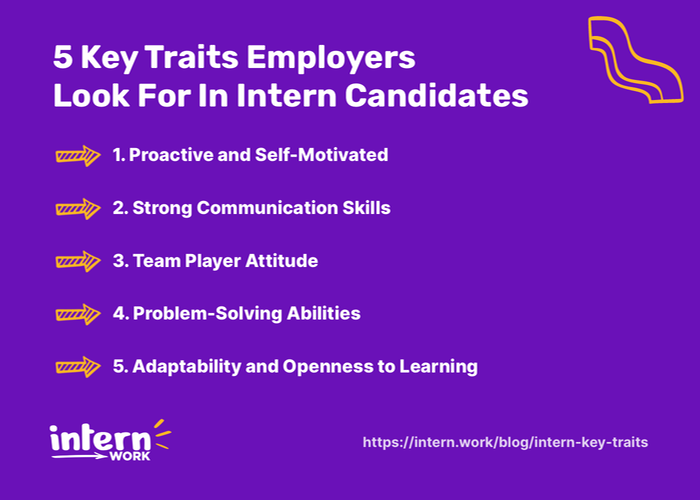
Internships are a vital stepping stone for students and recent graduates eager to kickstart their careers. These opportunities provide valuable hands-on experience and a glimpse into the real world of work. With fierce competition in the job market, employers have high expectations for intern candidates. To stand out from the crowd, it’s crucial to understand the key traits employers look for. This article will explore the five essential qualities employers value in intern candidates and why these traits are so important.
Internships in Career Development
Internships serve as a crucial stepping stone in the professional journey. They allow interns to apply theoretical knowledge in real-world scenarios, helping them gain practical skills and industry-specific expertise. Moreover, internships often provide a gateway to future job opportunities, allowing interns to build a network of professional contacts and gain references.
Internships offer a platform for individuals to showcase their abilities and potential to prospective employers. Individuals can demonstrate their commitment, dedication, and eagerness to learn by actively participating in internships. Employers highly value these qualities, indicating a candidate’s willingness to go the extra mile and take the initiative.

Internships open doors to job opportunities, help build professional networks, and provide references. Soft skills like communication, teamwork, problem-solving, and time management are developed during internships, enhancing personal growth and employability in a competitive job market.
Why Employers Value Interns
Employers highly value interns for several reasons. Firstly, interns bring fresh perspectives and innovative ideas to the table. They offer a different way of thinking, unburdened by years of experience in the field. This fresh perspective can be invaluable in driving organizational creativity and innovation.
Additionally, internships serve as a trial period for employers to evaluate potential candidates. By observing interns’ performance, work ethic, and ability to adapt to the professional environment, employers can assess their suitability for future full-time positions. This evaluation period allows employers to make informed decisions and invest in individuals who have proven their capabilities during the internship.
Internships also provide employers with an opportunity to build a pipeline of talent. Employers can identify and groom potential future employees by nurturing interns and providing them with valuable learning experiences. This strategic approach saves time and resources in the recruitment process. It ensures a smooth transition for interns into full-time roles.
Moreover, internships demonstrate a candidate’s commitment to professional growth and willingness to learn. Employers value individuals who are proactive in seeking opportunities to expand their knowledge and skills. Internships showcase candidates’ dedication to personal and career development, making them more attractive to potential employers.

Internships are highly regarded in the professional world due to their ability to bridge the gap between theoretical knowledge and practical application. They play a vital role in career development, allowing individuals to gain hands-on experience, explore different career paths, and develop essential skills. Employers value interns for their fresh perspectives, potential for future employment, and commitment to growth.
1. Proactive and Self-Motivated
One of the most sought-after traits in interns is the ability to take initiative and be self-motivated. Employers seek candidates who actively seek contributing opportunities and go above and beyond their assigned tasks. Being proactive demonstrates a willingness to take charge and a drive to make a meaningful impact.
The Importance of Initiative in the Workplace
In the fast-paced world of work, employers value individuals who can independently identify and tackle challenges. Taking the initiative helps to streamline processes, improve efficiency, and drive innovation within a company. Interns who actively seek ways to contribute can make a significant difference in the success of a team or organization.
For example, imagine a marketing intern who notices that the company’s social media strategy could be enhanced. Instead of waiting for instructions, the intern takes the initiative to research and propose a new approach. By doing so, they showcase their proactive nature and demonstrate their ability to think critically and contribute valuable ideas to the team.
Furthermore, being proactive in the workplace benefits the company and the individual. Taking charge of one’s professional development and seeking new challenges can lead to personal growth and career advancement. Employers recognize the value of self-motivated interns and are more likely to provide them with opportunities for learning and improvement.
Examples of Proactivity in Intern Candidates
Proactivity can manifest in various ways. It could be suggesting improvements to current processes, taking on additional responsibilities, or volunteering for projects outside one’s comfort zone. When employers see candidates actively engaging with their work and developing creative solutions, it leaves a lasting impression.
For instance, an intern working in a software development company might take the initiative to learn a new programming language or framework that is not directly related to their assigned tasks. By doing so, they expand their skillset and demonstrate their dedication to personal growth and their willingness to contribute to the company’s success in any way possible.
Another example of proactivity in intern candidates is when they take the initiative to seek feedback and actively work on improving their skills. Instead of waiting for their supervisor to provide feedback, proactive interns proactively seek guidance and take steps to enhance their performance. This shows a solid commitment to personal and professional development, which is highly valued by employers.
Being proactive and self-motivated is a highly desirable trait in intern candidates. It benefits the company by driving innovation and efficiency and allows interns to grow personally and professionally.
2. Strong Communication Skills
Effective communication is vital in any professional setting, and employers seek interns who can articulate their thoughts clearly and concisely.
Verbal Communication in a Professional Setting
Interns must be able to express their ideas confidently and professionally. Employers seek candidates who can engage in meaningful conversations, actively listen to others, and convey their thoughts clearly. Strong verbal communication skills foster collaboration and help build positive relationships with colleagues and clients.
Furthermore, interns with strong verbal communication skills are often seen as effective problem solvers. They can communicate their ideas and suggestions effectively, leading to innovative solutions and improved team dynamics. When interns can articulate their thoughts clearly and concisely, it enhances their ability to contribute to discussions and make a meaningful impact on projects.
In addition, interns with excellent verbal communication skills are more likely to succeed in networking events and professional gatherings. They can confidently introduce themselves, converse with industry professionals, and leave a lasting impression. These skills are invaluable in building a solid professional network and opening doors to future opportunities.
The Role of Written Communication in Business
Additionally, interns must excel in written communication. Written communication plays a critical role in daily work activities, such as composing emails, creating reports, and crafting presentations. Employers value interns who can write effectively, ensuring that information is conveyed accurately and professionally.
Interns with strong written communication skills can effectively convey complex ideas clearly and concisely. They have a keen eye for detail, ensuring their written work is free from grammatical errors and typos. This attention to detail reflects professionalism and enhances the overall quality of their work.
Moreover, interns who can write persuasively have a significant advantage in business. They can create compelling proposals, persuasive marketing materials, and convincing business plans. These skills are highly sought after by employers as they contribute to the success of various business initiatives.
Furthermore, interns with excellent written communication skills are often entrusted with important communication tasks, such as drafting official company documents, preparing press releases, and managing social media content. Their ability to write effectively ensures that the company’s message is conveyed accurately and resonates with the intended audience.
Lastly, interns with strong written communication skills are more likely to collaborate effectively. They can clearly articulate their ideas in written form, making it easier for their colleagues to understand and provide valuable feedback. This promotes a collaborative work environment and leads to improved project outcomes.
3. Team Player Attitude
In today’s highly collaborative work environments, possessing a team player attitude is a must for interns. Employers value individuals who can effectively work with others to achieve common goals.
The Power of Collaboration in the Workplace
Collaboration is essential as it fosters innovation and enhances productivity. Interns who can actively contribute to team discussions, support their colleagues, and share their expertise create a positive work environment that leads to better outcomes.
How Employers Assess Teamwork Skills
Employers assess a candidate’s teamwork skills by observing how they interact with others during group projects, team activities, or even in interviews. Demonstrating a willingness to create synergy within a team is highly regarded by employers, as it shows adaptability, flexibility, and the ability to work with diverse personalities.
4. Problem-Solving Abilities
Problem-solving skills are valuable assets in any workplace. Employers seek interns who can think critically and find innovative solutions to challenges.
Why Employers Value Critical Thinking
Employers value critical thinking skills as they enable interns to identify problems, analyze situations, and develop practical solutions. Interns who can think independently and offer unique perspectives contribute to a company’s success. Problem-solving skills are instrumental in overcoming obstacles and driving continuous improvement.
Demonstrating Problem-Solving Skills in an Interview
During the interview process, employers may ask candidates to share examples of how they have resolved problems in the past. Communicating a straightforward thought process and displaying creativity in finding solutions can greatly impress employers.
5. Adaptability and Openness to Learning
In today’s dynamic business environment, employers seek interns who are adaptable and eager to learn. Being open to new experiences and approaches allows interns to thrive in rapidly changing circumstances.
The Value of Adaptability in the Workplace
Adaptability is crucial as it enables interns to embrace change, navigate uncertain situations, and quickly adjust to evolving demands. Employers appreciate candidates who can readily adapt and remain composed in the face of challenges.
The Desire to Continuously Learn and Grow
Showcasing a genuine thirst for knowledge and a drive for professional growth impresses employers. Interns seeking opportunities to develop new skills and expand their knowledge demonstrate commitment and ambition, making them highly desirable candidates.

Key Takeaways
- Internships are essential entry points for students and recent graduates, offering real-world experience and insights into professional life amidst competitive job markets.
- Interns gain hands-on application of theoretical knowledge, develop practical skills, and establish industry-specific expertise. Internships also facilitate networking and provide references for future opportunities, while qualities like commitment, dedication, and learning eagerness set candidates apart.
- Interns bring fresh perspectives and innovative ideas, acting as trial candidates. Employers assess their potential suitability through performance and adaptability, nurturing them for future full-time roles to save recruitment resources.
- Proactive interns who take the initiative in suggesting improvements, assuming additional responsibilities, and seeking feedback contribute to process streamlining and innovation, benefiting both the company and individual growth.
- Effective verbal and written communication is crucial for collaboration, problem-solving, and networking. It enables confident interactions, clear articulation of ideas, and persuasiveness in proposals, thereby enhancing project outcomes and professionalism.
- In collaborative workplaces, being a team player is vital. Interns who actively participate, support colleagues and contribute expertise foster a positive environment and better results.
- Employers value interns' critical thinking and innovative solutions to challenges, aiding in identifying issues, analyzing situations, and continuous improvement.
- Adaptable interns thrive in rapidly changing environments. At the same time, a thirst for continuous learning showcases commitment, ambition, and attractiveness to employers seeking growth-oriented candidates.
Wrapping Up
By embodying these five key traits, intern candidates can significantly increase their chances of securing valuable internship opportunities. Proactivity, strong communication skills, a team player attitude, problem-solving abilities, and adaptability are traits that employers value in interns. Understanding the importance of these qualities and actively implementing them throughout the internship application process can set candidates apart from the competition.





